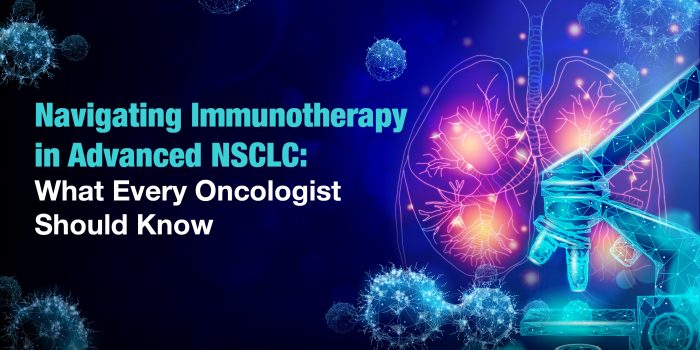
The advent of immunotherapy has significantly extended survival and revolutionized care in advanced non-small cell lung cancer (NSCLC). Monoclonal antibodies, such as cemiplimab, pembrolizumab, atezolizumab are used to combat tumor evasion strategies via the PD-1/PD-L1 checkpoint, restoring the immune system’s ability to act against cancer cells. The CTLA-4 checkpoint is also targeted in dual-immunotherapy regimens, such as nivolumab/ipilimumab and durvalumab/tremelimumab.
Broad-based molecular testing is important to identify molecular alterations that make tumors susceptible to frontline targeted therapy and less likely to respond to immunotherapy. Given the ever-evolving list of actionable alterations, next-generation sequencing (NGS) is strongly recommended in adenocarcinoma and suggested in squamous NSCLC. It is important for clinicians to be aware of nuances with respect to use of complimentary RNA-based NGS, adding stand-alone tests for faster results, and the incorporation of liquid biopsy techniques.
Immunohistochemistry testing for PD-L1 expression is recommended for all NSCLC irrespective of histology and is usually ordered in tandem with NGS. High expression levels (≥50%) denote eligibility for checkpoint inhibitor monotherapy per approved indications, while lower levels indicate benefit for add-on chemotherapy. Approved options are limited for tumors with PD-L1 expression <1%.
Once targetable alterations have been ruled out, selection of an immunotherapeutic regimen should not depend solely on PD-L1 expression levels. Other important factors, such as symptom severity, disease burden, and patient status/comorbidities should also be considered. Staying up-to-date with the latest clinical trial data is important, including subanalyses that may point to an optimal regimen in certain circumstances, such as presence of PD-L1-negative squamous NSCLC or central nervous system (CNS) metastases.
In general, immunotherapy is associated with significantly fewer grade ≥3 toxicities than chemotherapy and patients report improved or stable quality of life. However, restoring immune activity against tumors can lead to a ‘supercharged’ effect that manifests as inflammatory events, most commonly involving the skin, endocrine glands, gastrointestinal tract, liver, and lungs. Most of these immune-related adverse events (irAEs) are low-grade and resolved effectively with dose interruptions and/or corticosteroids; others, such as those affecting the thyroid and pancreas, may require lifelong replacement therapy. Early diagnosis and multidisciplinary, interprofessional management are integral to ensuring that irAEs are appropriately managed.
Learn more: Rapid advances in the field of NSCLC immunotherapy have given many patients their lives back – but for clinicians, the evolving biomarker testing strategies, therapeutic options and combinations, and irAE management strategies can be difficult to keep up with. Join us for expert, evidence-based insights that will help you navigate the complexities of determining patient candidacy for immunotherapy, selecting an optimal regimen, and ensuring the highest level of care.
For more on NSCLC, check out CE activity below!
Harnessing the Full Potential of Frontline Immunotherapy in Advanced NSCLC: Proceedings from a Clinical Olympics℠
Share on Social Media